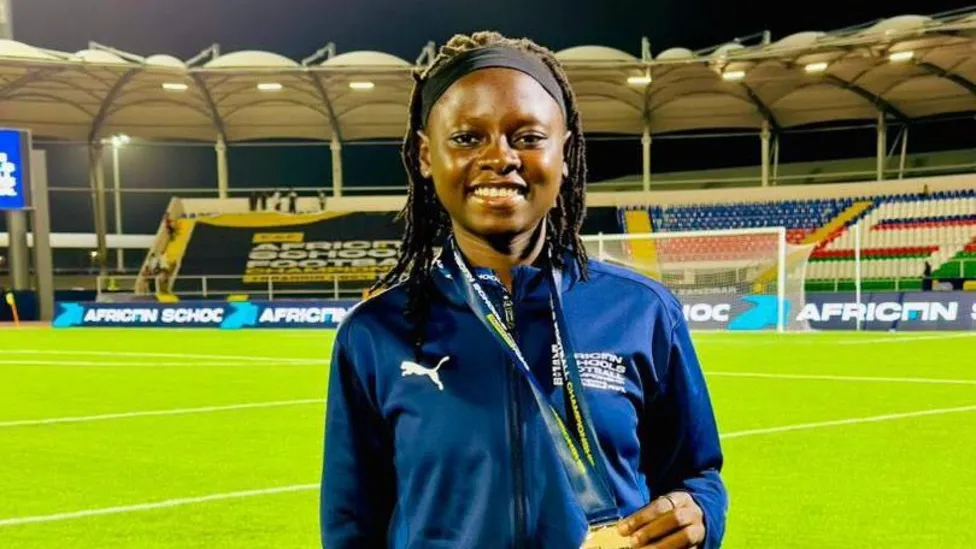Navigating the Pitch: Gbemisola Yusuf’s Journey as Nigeria’s Rising Referee
3 min read
Gbemisola Yusuf used to sell drinks at football games in Nigeria but is now a qualified referee.

Gbemisola Yusuf used to sell drinks at football games in Nigeria but is now a qualified referee.
At just 21 years old, Gbemisola Yusuf is making waves in Nigerian football as a referee. Her passion and resilience in the face of numerous challenges highlight her extraordinary journey in a predominantly male-dominated field.
Yusuf’s fascination with football began early in her life. Growing up in Agege, a bustling district in Lagos, she and her mother would sell drinks at the local stadium, an experience that ignited her love for the sport. The vibrant energy of the stadium was a backdrop to her childhood, and her immersion in the football scene was almost inevitable.
Her transition from aspiring footballer to referee was marked by a mix of curiosity and support. Yusuf’s decision to become a referee was met with encouragement from her mentor, Dele Atoun, a retired referee and general secretary of the Lagos State Referee Council. He noted that Yusuf’s life had always been intertwined with the stadium, and her courage in the face of adversity was commendable. Despite witnessing referees endure abuse, Yusuf remained steadfast, driven by her passion for the game.
Yusuf’s refereeing career began at the tender age of 14, when she joined a program initiated by the Confederation of African Football (Caf) to nurture young match officials. This early exposure to the world of refereeing was not without its trials. The role of a referee in Nigeria is fraught with difficulties, including verbal and physical abuse from players and fans. A survey by the Nigeria Referees Association (NRA) revealed that about 80% of referees have faced some form of harassment, particularly at grassroots and lower league matches where security is often minimal.
Despite these challenges, Yusuf has remained resolute. She recalls a pivotal moment at 18 when she was asked to officiate a state league match on short notice. Her performance was impressive, catching the eye of many in the refereeing community and marking the beginning of her rapid rise through the ranks. Her skill and composure earned her a spot in the Nigerian Women’s Premier League, a significant achievement that comes with its own set of challenges, particularly for female referees.
The issue of safety for female referees in Nigeria is a pressing concern. In 2021, a female referee faced an alarming situation in Kano, where fans chased her after a contentious local derby. This incident, condemned by the Nigeria Football Federation, underscored the need for better security measures at matches involving female officials. Statistics reveal that women constitute less than 10% of registered referees in Nigeria, with many citing fear of abuse and lack of respect as deterrents from pursuing the profession.
Adding to the challenges, Nigerian leagues, including the top-tier Nigeria Premier Football League, have yet to adopt video assistant referee (VAR) technology, putting local referees at a disadvantage in international settings where VAR is standard. Despite these hurdles, Yusuf remains optimistic, focusing on doing her best on the field and placing her trust in her abilities and faith.
Her deep connection to the Agege Stadium remains a cornerstone of her identity. Although she no longer sells drinks there due to her academic commitments at the University of Lagos, where she is studying human kinetics and education, the stadium’s significance in her life endures. Yusuf’s journey has come full circle, with her recent participation in the Caf African Schools Football Championship being a testament to her growth and dedication. Officiating matches in regional qualifiers and the finals in Tanzania was a milestone that she describes as a dream come true.
The experience not only broadened her horizons but also allowed her to interact with international referees and learn new languages, an asset for those aiming for the top levels of the sport, such as the FIFA World Cup or the Olympics. Yusuf’s encounter with notable referees, including Zambia’s Janny Sikazwe, who has officiated at the World Cup, was particularly inspiring.
With the ongoing support and guidance from mentors like Dele Atoun, Yusuf’s story is one of resilience and determination. Her achievements reflect not only her personal strength but also the growing representation of women in football officiating. As she continues to break barriers, Yusuf remains a symbol of the potential and progress women can achieve in sports.